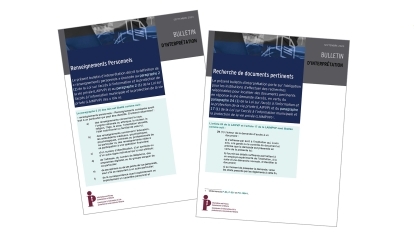| To resolve Ontarians’ appeals and complaints in a fair, timely and meaningful manner, our office has made significant efforts to improve our tribunal processes and procedures and demonstrate greater transparency with parties about the IPC appeals process. Some of these efforts are highlighted below. |
Clearing the slate: Strategies to eliminate file backlogs

Over the past year, our tribunal has made significant strides in improving the efficiency and responsiveness of our services through enhancements to our internal processes and our Case Resolution Information System. In 2023, we embarked on several key initiatives, directly addressing our file backlog, and enhancing our operational effectiveness while navigating a record volume of over 3,100 incoming cases.
In July 2023, we began planning to create an expedited appeals process in 2024. The pilot project aims to streamline and resolve straightforward cases through a single-person processing model from beginning to end, significantly reducing processing times.
These and other dedicated efforts have been crucial in managing and reducing our case backlog. Our team closed more than 2900 files in 2023, just shy of repeating our 2021 record for number of file closures. More than 85 per cent of files were successfully resolved to the parties’ satisfaction or dismissed through early resolution or mediation, avoiding the need for a more formal and lengthy adjudication process. The IPC’s tribunal was also successful in reducing the average time taken to resolve a file by a notable 18 per cent compared to last year.
Procedural clarity: Updates to FIPPA/MFIPPA code of procedure

The IPC dedicated the past year and a half to reviewing and updating its FIPPA/MFIPPA code of procedure to reflect new processes and procedures adopted since it was last reviewed in 2004. These changes aim to enhance process efficiencies and accommodate for modern e-appeals. In September 2023, the updated code was released for public review and comment. The final code will be published and implemented in 2024.
The new code will:
- reflect the IPC’s current procedures for processing e-appeals under FIPPA and MFIPPA
- improve timeliness for the processing of appeals
- maintain the fair and just consideration of appeals
- provide greater transparency and understanding of the IPC’s procedures when considering appeals
Interpretation Bulletins: Guidance simplified

In fall 2023, the IPC developed Interpretation Bulletins to promote a greater understanding of Ontario’s access and privacy laws, increase the transparency of our adjudication process, and help people involved in an appeal better understand what to expect.
The Interpretation Bulletins provide insight into how the IPC and the courts have interpreted different sections of FIPPA and MFIPPA when reviewing appeals. By codifying these interpretations and making them readily available on the IPC’s website, these bulletins can provide early and concrete guidance to institutions, so they are better positioned to know how to respond to information requests right from the outset.
Interpretation Bulletins cover the following topics:
- Custody or Control
- Fees and Fee Waivers
- Frivolous or Vexatious Requests
- Personal Information
- Reasonable Search
Additional interpretation bulletins on other frequently cited topics are slated to be published in 2024.
A review of noteworthy cases

Mediation: A collaborative path to resolution
When cases cannot be quickly resolved at an early stage, our skilled mediation team takes over to assist parties in discussing and resolving the issues. The objective is to reach a consensus that satisfies all parties involved. These professional mediators establish an environment where individuals can voice their interests, perspectives, and concerns. When appropriate, mediators also provide guidance to the parties to help manage expectations. Resolving appeals via mediation dramatically reduces the number of cases that proceed to the more formal adjudication process.
The government must amend both FIPPA and MFIPPA to establish a comprehensive privacy protection framework that positions Ontario well for an evolving digital world that is resilient to rapid change and provides the next generation with optimism about their future. This amended framework should include mandatory privacy breach reporting and more explicit accountability and transparency requirements for government institutions to respond to breaches and mitigate against the risk of breach in the first place. It should also include provisions for initiating privacy complaints, including commissioner-initiated complaints, and more explicit powers of investigation for the IPC, including the power to compel the production of evidence and to issue binding orders. Such reforms are crucial for ensuring consistent privacy protections, enhancing institutional accountability, and maintaining public trust and confidence across Ontario’s public and broader public sectors.

Insightful analytics
In 2023, Ontarians submitted 66,422 freedom of information requests, more than a 14 per cent per cent increase over the previous year.
Response rates, indicated by the number of access requests fulfilled within a 30-day timeframe, varied across sectors. For provincial institutions subject to FIPPA, over 67 per cent of access requests were successfully addressed within 30 days, signifying an improvement compared to 2022, when just 51.2 per cent of requests were completed within 30 days.
Municipal institutions covered by MFIPPA completed 80.2 per cent of requests within 30 days, consistent with the previous year's rate.
Ontarians submitted 105,163 requests for access to personal health information under PHIPA in 2023, up five per cent over the previous year. Health information custodians successfully maintained a commendable 30-day response rate in 98.7 per cent of cases.
Under the CYFSA, child and family service providers fulfilled 10,952 access requests for personal information, up ten percent over the previous year, with 72.6 per cent of those completed within 30 days.







